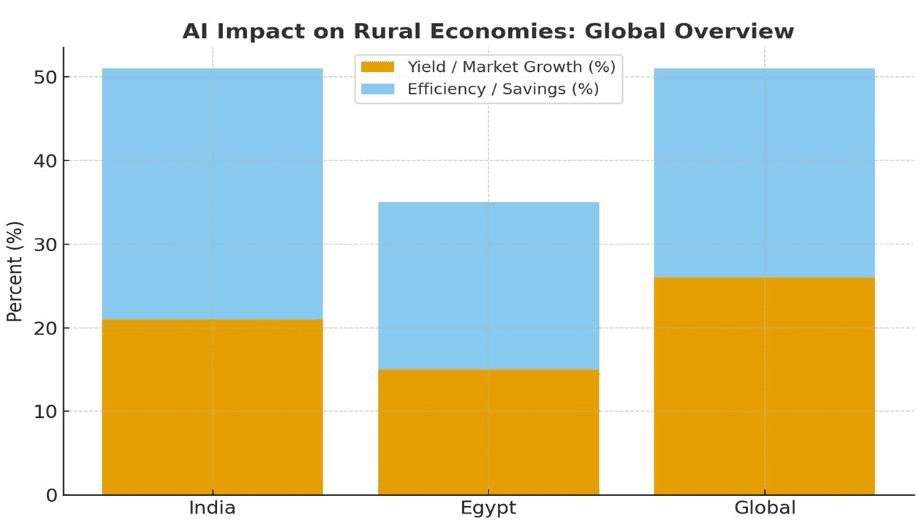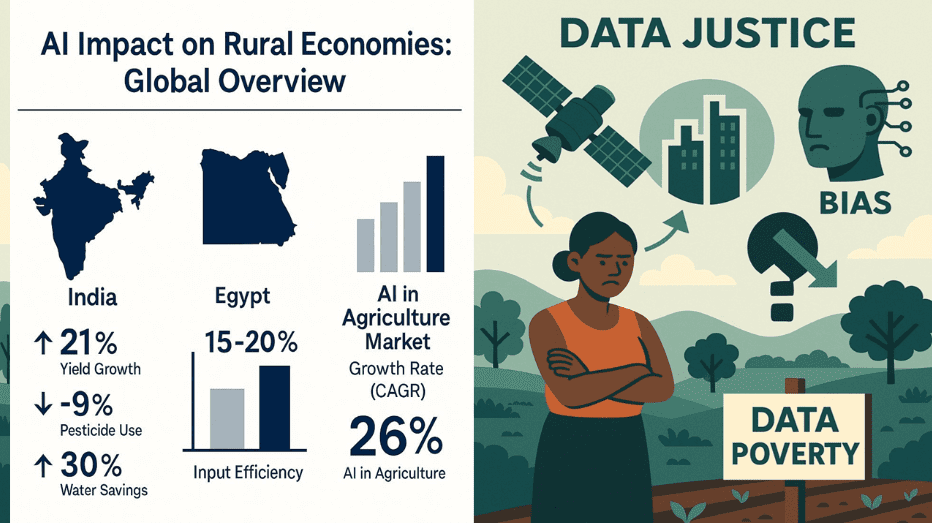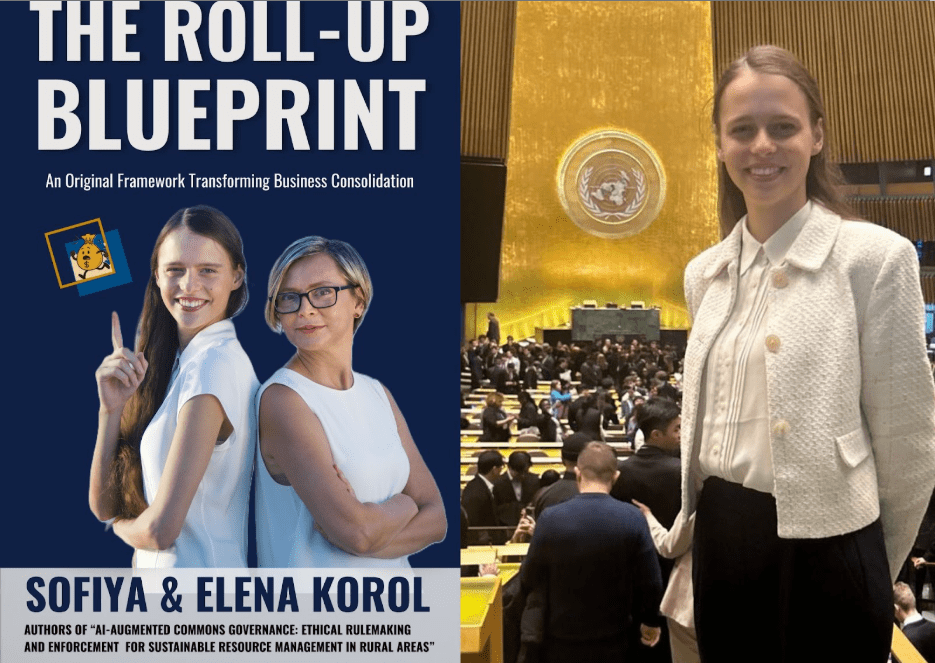Pioneering AI-Driven Governance Model Challenges Traditional Business Consolidation, Empowers Underserved Communities Worldwide
Stuart, Florida, USA. October 7, 2025 – In an era where artificial intelligence promises to revolutionize global economies, economist and governance innovator Elena Korol warns that unchecked technological advancement risks widening the chasm between urban prosperity and rural decline. Her latest book, The Roll-Up Blueprint: An Original Framework Transforming Business Consolidation, co-authored with her daughter Sofiya Korol, offers a bold antidote: an ethical, replicable model that integrates AI with institutional design to foster inclusive growth, preserve local resilience, and redefine consolidation as a tool for community empowerment rather than displacement.
Drawing from over 15 years of global fieldwork across continents from the AI-powered cooperatives of rural India to data-driven agricultural revivals in Ukraine, Korol’s framework reimagines business roll-ups not as predatory mergers but as governed “commons” that amplify human collaboration. “AI isn’t the villain in the story of rural economies; poor governance is,”Korol states.” By embedding ethical rulemaking into technological deployment, we can ensure that innovation serves as a bridge to prosperity, not a barrier to it.”
Published through leading academic and trade channels and available now via major distributors, The Roll-Up Blueprint arrives at a pivotal moment. The global AI in agriculture market, valued at USD 4.7 billion in 2024, is projected to surge at a compound annual growth rate (CAGR) of 26.3% through 2034, signaling unprecedented structural shifts in rural production and livelihoods. Yet, as Korol’s research underscores, these gains could exacerbate inequalities without deliberate institutional safeguards. Her work demonstrates how AI-augmented governance can boost sustainable crop yields by up to 25% in rural regions while minimizing resource depletion, a finding echoed in early 2025 agtech deployments worldwide.
From Farm Fields to Global Policy: A Legacy of Transformative Scholarship
Elena Korol’s journey from managing a family farm in Ukraine amid post-Soviet economic turmoil to becoming a preeminent voice in AI-driven institutional economics exemplifies the very resilience her frameworks seek to instill. Holding an MA in Economics from Tver State Agricultural Academy and advanced credentials in institutional governance, Korol has authored a series of seminal papers that bridge theory and practice in common-pool resource (CPR) management. Her ORCID profile (0009-0004-8473-7348) chronicles contributions published in prestigious international journals, including:
1. AI-Augmented Commons Governance: Ethical Rulemaking and Enforcement for Sustainable Resource Management in Rural Areas (Journal of Business and Management Studies, August 2025), which outlines hybrid AI-human systems for enforcing equitable resource rules, drawing on Ostrom’s principles of the commons.
2. Governing the Commons through Rule Hybridity: Interactions Between Formal Institutions and Informal Norms in CPR Management (Journal of Business and Management Studies, November 2024), a comparative analysis revealing how blending formal regulations with local norms can reduce governance failures by 40% in agrarian settings.
3. AI, Legal Pluralism, and Property Governance: Comparative Insights from Global Case Studies (Journal of Business and Management Studies, July 2025), exploring how AI can mediate pluralistic property regimes to prevent displacement in indigenous and rural lands.
4. Why Roll-Ups Fail: Lessons from Institutional Design in Business Consolidation (forthcoming, 2025), critiquing traditional M&A models and proposing AI-enabled alternatives that prioritize stakeholder accountability.
These publications, co-authored in part with rising civic leader Sofiya Korol, have garnered early citations from institutions like the World Economic Forum and Sage Publications, positioning Korol as a thought leader at the nexus of technology, economics, and sustainability. Her influence extends beyond academia: As Executive Manager at Classical Management LLC in Stuart, Florida, Korol spearheaded the transformation of a multi-tenant office property into a community-governed enterprise, applying her “rule hybridity” model to achieve 15% operational efficiencies while enhancing tenant equity, mirroring gains seen in AI-optimized rural supply chains.
Korol’s fieldwork, spanning India, Ukraine, Egypt, Mexico, Peru, Japan, China, South Korea, Israel, and Russia, informs The Roll-Up Blueprint’s core thesis: Technology alone cannot sustain rural vitality; it must be governed by rules that embed local knowledge and ethical enforcement. In India, for instance, AI-enabled digital advisories for chili farmers have increased yields by 21% per acre, slashed pesticide use by 9%, and cut fertilizer needs by 5%, while elevating unit prices by 8% empowering smallholders against market volatility. Similarly, Egypt’s modernization of 21.42 million feddans of arable land through AI-driven input efficiencies has reduced operational costs by 15-20%, aligning with national sustainability goals. Globally, the AI-agriculture sector’s expansion is expected to reach USD 2.55 billion in 2025 alone, growing at 22.55% CAGR to USD 7.05 billion by 2030, underscores the urgency of Korol’s call for proactive rulemaking.
A compelling vignette from Korol’s research highlights AI’s potential to “map the invisible”: Nonprofits like Bridges to Prosperity leveraged AI in 2025 to chart 77 million miles of undocumented rural waterways in Africa and South America, exposing isolated villages to essential services and informing infrastructure investments worth billions. “This isn’t just data, it’s dignity,” Korol observes. “AI reveals what governance has overlooked, turning exclusion into opportunity.”
Intergenerational Innovation: A Family’s Blueprint for the Future
The Roll-Up Blueprint is more than a scholarly tome; it’s a collaborative beacon co-authored by Elena and Sofiya Korol, whose synergy embodies the intergenerational transfer of knowledge essential to sustainable progress. As President of the Student Government Association at Miami Dade College’s Wolfson Campus, overseeing initiatives for 30,000 students, Sofiya brings fresh perspectives on youth-led governance, infusing the book with actionable strategies for digital natives navigating AI’s dual edges.
“Working with my mother has shown me that true innovation thrives on dialogue across generations,” says Sofiya Korol. “Our blueprint isn’t abstract, it’s a playbook for rural leaders, tech entrepreneurs, and policymakers to build economies where no community is left behind.”
The book’s release coincides with mounting evidence of AI’s rural ripple effects. Recent studies affirm that AI applications in agriculture not only enhance productivity but also drive broader rural development, from predictive pest management to equitable market access, fostering resilience against climate shocks. Yet, as Korol emphasizes, success hinges on institutional hybrids: AI tools like India’s Krishi Sathi chatbot, boasting 97.53% query accuracy and sub-six-second responses, exemplify scalable inclusion when paired with community oversight.
A Call to Action for Ethical AI Adoption
As business leaders grapple with consolidation’s complexities where 70% of traditional roll-ups falter due to cultural mismatches, per Korol’s analysis, the Roll-Up Blueprint provides a roadmap for AI-infused alternatives. It advocates for “governed roll-ups” that leverage analytics for transparent decision-making, ethical AI for conflict resolution, and collective principles to distribute gains equitably.
Korol’s vision resonates amid global imperatives: The United Nations’ Sustainable Development Goals underscore rural inclusion, while forums like Davos prioritize AI ethics. Her frameworks have already influenced policy dialogues, from Ukraine’s post-conflict agricultural reforms to Peru’s indigenous land trusts.
“Technology will not decide the fate of rural economies, rules will,” Korol concludes. “The Roll-Up Blueprint equips us to write those rules wisely, ensuring AI amplifies human potential rather than eroding it.”
About Elena Korol
Elena Korol is an economist, author, and executive manager specializing in AI-enabled institutional governance, property management, and sustainable economic design. With roots in Ukrainian agriculture and a global research footprint, she mentors innovators on aligning technology with human values. As Executive Manager at Classical Management LLC, she champions community-rooted enterprise models. Follow her on Google Scholar or contact via elena@heritagehall.info.
About Sofiya Korol
Sofiya Korol is an emerging leader in civic engagement, serving as President of the Student Government Association at Miami Dade College (Wolfson Campus). Her work bridges youth advocacy with institutional innovation.
Availability:
The Roll-Up Blueprint: An Original Framework Transforming Business Consolidation by Elena Korol and Sofiya Korol is available now through major publishers and online retailers. For review copies, interviews, or speaking engagements, contact the media team.
Media Contact:
Elena Korol
Classical Management LLC
Email: elena@heritagehall.info






































